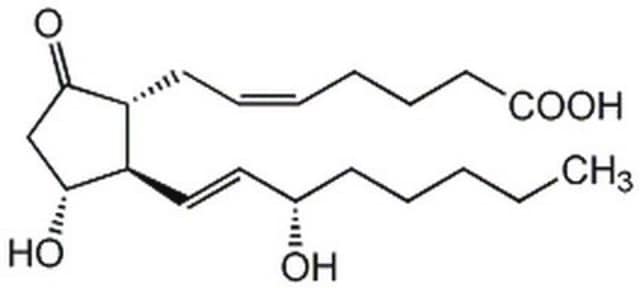P7265
Prostaglandin A1
≥98% (HPLC), powder, NF-κB inhibitor
Synonyme(s) :
(13E,15S)-15-Hydroxy-9-oxoprosta-10,13-dien-1-oic acid, PGA1
About This Item
Produits recommandés
product name
Prostaglandin A1, synthetic
Source biologique
synthetic
Niveau de qualité
Pureté
≥98%
Forme
powder
Température de stockage
−20°C
Chaîne SMILES
O=C1[C@H](CCCCCCC(O)=O)[C@@H](/C=C/[C@H](CCCCC)O)C=C1
InChI
1S/C20H32O4/c1-2-3-6-9-17(21)14-12-16-13-15-19(22)18(16)10-7-4-5-8-11-20(23)24/h12-18,21H,2-11H2,1H3,(H,23,24)/b14-12+/t16-,17-,18+/m0/s1
Clé InChI
BGKHCLZFGPIKKU-LDDQNKHRSA-N
Vous recherchez des produits similaires ? Visite Guide de comparaison des produits
Actions biochimiques/physiologiques
Mention d'avertissement
Danger
Mentions de danger
Conseils de prudence
Classification des risques
Acute Tox. 4 Oral - Repr. 1B
Code de la classe de stockage
6.1C - Combustible acute toxic Cat.3 / toxic compounds or compounds which causing chronic effects
Classe de danger pour l'eau (WGK)
WGK 3
Point d'éclair (°F)
Not applicable
Point d'éclair (°C)
Not applicable
Équipement de protection individuelle
Eyeshields, Gloves, type N95 (US)
Certificats d'analyse (COA)
Recherchez un Certificats d'analyse (COA) en saisissant le numéro de lot du produit. Les numéros de lot figurent sur l'étiquette du produit après les mots "Lot" ou "Batch".
Déjà en possession de ce produit ?
Retrouvez la documentation relative aux produits que vous avez récemment achetés dans la Bibliothèque de documents.
Les clients ont également consulté
Articles
Discover Bioactive Small Molecules for Lipid Signaling Research
Discover Bioactive Small Molecules for Lipid Signaling Research
Discover Bioactive Small Molecules for Lipid Signaling Research
Discover Bioactive Small Molecules for Lipid Signaling Research
Notre équipe de scientifiques dispose d'une expérience dans tous les secteurs de la recherche, notamment en sciences de la vie, science des matériaux, synthèse chimique, chromatographie, analyse et dans de nombreux autres domaines..
Contacter notre Service technique







